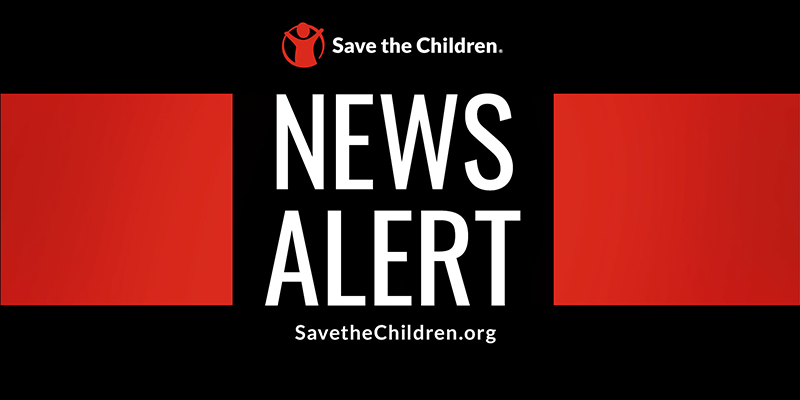
Storm Batsirai: Children in Madagascar prepare for second major Storm
FAIRFIELD, Conn. (Feb. 04, 2022) – Families in Madagascar are bracing for the second tropical Storm in two weeks, following the most severe drought the country's south has faced in 40 years, according to Save the Children.
Less than three months after the United Nations Climate Change Conference (COP26), where world leaders failed to commit to enough funding for the world's poorest countries, the situation facing children in Madagascar is a stark illustration of the impacts of the climate emergency, the organization said.
Storm Batsirai is expected to be a Category 3 or 4 cyclone that could force as many as 140,000 people in Madagascar, including tens of thousands of children, from their homes[i]. Cyclone Idai, which tore through south-east Africa three years ago and was one of the strongest tropical cyclones to hit Africa and the southern hemisphere, was a Category 3 cyclone[ii].
Extreme weather events such as Storm Batsirai – which has already torn through Mauritius and Reunion and is projected to make landfall on Madagascar on Saturday—are becoming more frequent as a result of the climate crisis. The destruction caused by multiple successive extreme weather events shows the immediate need for more funding from higher-income countries to support lower-income countries in dealing with climate impacts, says Save the Children.
The new tropical Storm comes just two weeks after Storm Ana made landfall in Madagascar, causing flooding, landslides, and loss of life, as well as forcing 72,000 people from their homes. The Storm also put education out of reach for 9,271 children across the country, completely destroying 70 classrooms and partially damaging 440 others[iii]. Storm Ana then swept onto the coast of the main African continent, wreaking havoc.
Meanwhile, the south of Madagascar continues to experience the most severe drought in 40 years. Last year, some families described how hungry children play games cooking with sand, soil, and leaves and eating them to feel full.
Save the Children's Programme Director for Madagascar, Tatiana Dasy, said:
"The people who had the power and the platform at COP26 three months ago, particularly those in countries that have economically benefitted from producing the most global emissions, are back to 'business as usual.'
"Meanwhile, children in Madagascar have been going to bed hungry because of the drought, have had their classrooms destroyed by Storm Ana, and are now bracing themselves for a severe cyclone that could rip their homes away. How is any of this their fault, and why should they be condemned to a life without basic needs such as food, shelter, and an education? This is too much for a child to bear."
Yolande Wright, Save the Children's Global Director of Child Poverty and Climate, said:
"Leaders talk about the climate emergency as a ticking time bomb, but in the countries most vulnerable to its impacts, like Madagascar, that bomb has already gone off. Sadly, extreme weather events, and their deadly impacts on children, their families, and communities, are likely to continue to worsen as global emissions rise and the likelihood of limiting warming to 1.5 degrees becomes more remote."
"At COP26, there was an opportunity for high-income countries and historical emitters to pledge more funding to help countries like Madagascar cope with these kinds of extreme weather events. Unfortunately, this opportunity was tragically missed, and we continue to see some of the world's poorest countries forced to deal with the consequences."
Save the Children in Madagascar is monitoring the situation over the coming days and is prepared to work with local authorities and other agencies to respond where it is needed.
[i] According to Madagascar's National Office of Risk and Disaster Management
[ii] According to the Saffir-Simpson scale, which is a cyclone classification scale, there are five levels of cyclone intensity.
[iii] According to the Education Cluster of humanitarian agencies in Madagascar
Save the Children believes every child deserves a future. Since our founding more than 100 years ago, we've been advocating for the rights of children worldwide. In the United States and around the world, we give children a healthy start in life, the opportunity to learn and protection from harm. We do whatever it takes for children – every day and in times of crisis – transforming the future we share. Our results, financial statements and charity ratings reaffirm that Save the Children is a charity you can trust. Follow us on Facebook, Instagram, Twitter and YouTube.
Thank you for signing up! Now, you’ll be among the first to know how Save the Children is responding to the most urgent needs of children, every day and in times of crisis—and how your support can make a difference. You may opt-out at any time by clicking "unsubscribe" at the bottom of any email.
By providing my mobile phone number, I agree to receive recurring text messages from Save the Children (48188) and phone calls with opportunities to donate and ways to engage in our mission to support children around the world. Text STOP to opt-out, HELP for info. Message & data rates may apply. View our Privacy Policy at savethechildren.org/privacy.